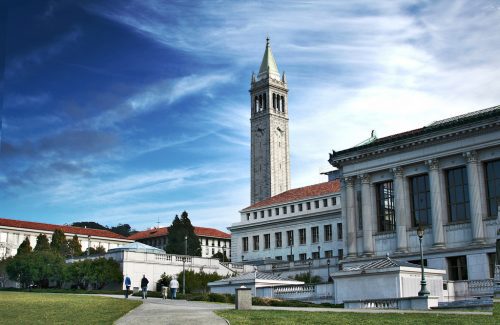
Press release: UC Berkeley Study Touts Economic Benefits of a Feed-In Tariff
Analysis shows unparalleled job growth, tax benefits, and investment potential of a comprehensive FIT achieving the 33% RPS.
Analysis shows unparalleled job growth, tax benefits, and investment potential of a comprehensive FIT achieving the 33% RPS
Berkeley – University of California, Berkeley announces today the results of a study examining the economic benefits of a comprehensive Feed–In Tariff (FIT). The analysis shows that enacting a robust FIT in California to achieve the state’s 33% Renewables Portfolio Standard (RPS) would create 3 times the number of jobs, over 2 billion in additional tax revenue, and stimulate tens of billions in new investment. Furthermore, the adoption of a comprehensive FIT will cost-effectively fulfill California’s 33%-by-2020 goal on schedule.
Headed by Distinguished Professor of Energy Dan Kammen of UC Berkeley‘s Energy and Resources Group, the analysis examined the economic benefits of a FIT deployed in California to facilitate the state’s effort to achieve the 33% RPS by 2020. A FIT is essentially a fixed price, long-term contract for a utility to buy electricity produced by renewable energy generators. The Berkeley study specifically examined a FIT that would be available to solar projects up to 20 megawatts (MW) in size. Professor Kammen and his colleague Max Wei studied the impact ofsuch a FIT on employment, tax revenue, and investment compared to current RPS scenarios being modeled by California regulatory agencies.
The study‘s key findings include that three times the number of jobs will be created if a FIT is enacted to complement the RPS. This translates into roughly 280,000 more jobs over the next decade, or an average of 28,000 jobs per year, with more jobs created in the early years because wholesale distributed generation (WDG) projects can come online quickly. Another key finding includes over $2 billion in additional tax revenue for the state. Further, the study found that a comprehensive FIT would stimulate up to $50 billion in new private investment in the state with the potential for those renewable energy projects to be eligible for another $15 billion in federal tax benefits.
Craig Lewis, Executive Director of the FIT Coalition, expressed his enthusiasm for the study, “Dan Kammen and his group at UC Berkeley are the most knowledgeable experts on the renewable energy and economic considerations that were examined in this study. The conclusions confirm the FIT Coalition’s unvarying position that FITs are the best policy mechanism for accelerating the deployment of cost-effective renewables while delivering tremendous economic benefits wherever FITs are designed to achieve scale. This study will open many policymakers’ minds to the unparalleled benefits of FITs and their ability to unleash the wholesale distributed generation market segment.”
“I’ve worked closely with state and national policymakers providing research on renewable energy and economic policies to help craft legislation. In examining the effects of a FIT inCalifornia, I was pleased at what the policy could do for the state. The economic benefits are clear. A FIT policy that is sized to the state’s RPS goals would produce significant distributed renewable energy generation growth across California – creating jobs, attracting investment and helping alleviate state budget issues. These key results should be carefully considered by policymakers across the political spectrum,” said Kammen.
“This report demonstrates the benefits of using a feed–in tariff as one of the tools to achieve job creation and get our economy back on track in addition to achieving energy independence and reducing our need for fossil fuels. It is a wonderful guide to the kind of policies that will get us to a more prosperous and sustainable energy economy. I am grateful to Dan Kammen, Max Wei, and their colleagues for continuing to produce the kind of solid analysis we need to make better policy decisions,” stated Senator Fran Pavley (D-Agoura Hills) in review of the report.
“Today, utilities are already having trouble reaching their renewable portfolio standards. This study shows that a Feed–In Tariff can help California create a greener, more sustainable energy supply system. Feed–in tariffs can not only help reduce our dependence on dirty energy but, if done properly with sufficient public input,should also lead to well-paying jobs for Californians,” said Assemblymember Ira Ruskin (D-Redwood City) in response to UC Berkeley‘s findings.
Commissioner Jeff Byron at the California Energy Commission reviewed the study and had the following to say, “The work of theRenewable and Appropriate Energy Laboratory verifies the conclusions of the Energy Commission regarding Feed–In Tariffs and why we have supported their adoption in the past. I hope my colleagues at the CPUC are persuaded to expand their previous FIT decision to 20 MW with unlimited applications. As the UC Berkeley Study shows, job creation and capital investment opportunities are compelling reasons to expand this renewable policy mechanism and require utilities to implement FITs.”
Araceli Ruano, Senior Vice President and Director of California’s Center for American Progress office, had the following to say on the UC Berkeley report, “The Center for American Progress has conducted extensive research that shows Americans are ready to embrace clean energy and the policies needed to make the transition to a clean energy economy.The UC Berkeleyreport demonstrates that feed–in tariffs are a powerful tool that can make that change possible while delivering tremendouseconomic benefits from day oneand providing significant savings to ratepayers within a few years.”
“The Los Angeles Business Council supports the findings of the UC Berkeley report saying that a well-designed FIT will create steady growth in renewable energy deployments, which will spur job creation and increased tax revenue in one of the most important industries to American economic leadership over the coming decades,” commented Mary Leslie, President, Los Angeles Business Council.
Hanafi Fraval, President of Innate Energy California, LLC, a biomass technology company that converts waste to energy, also received an advance copy of the report. Fraval remarked, “This report is significant because it underscores the need for California to quickly put policies inplace that help small renewable energy generators get going. A FIT will help companies like mine create a boom in jobs and revenue for the state while developing our clean energy industry and bringing our cost of energy down over time. It is imperative that policymakers act quickly on the findings of this study by implementing a comprehensive FIT to fulfill the 33% RPS.”
For details on the study‘s methodology, please see the accompanying summary or view the entire report at http://www.fitcoalition.com/economic-benefits-of-a-fit/.
The FIT Coalition is a leading force in replicating Feed–In Tariffs and other global renewable energy best-practices throughout the United States. The FIT Coalition’s mission is to identify and advocate for policies that will accelerate the deployment of cost-effective renewable energy in the United States. The FIT Coalition believes the right policies will result in a timely transition to renewable energy while yielding tremendous economic benefits, including new job creation, increased tax revenue, and the establishment of an economic foundation that will drive growth for decades. The FIT Coalition is active at the national, state, and municipal levels.
###

